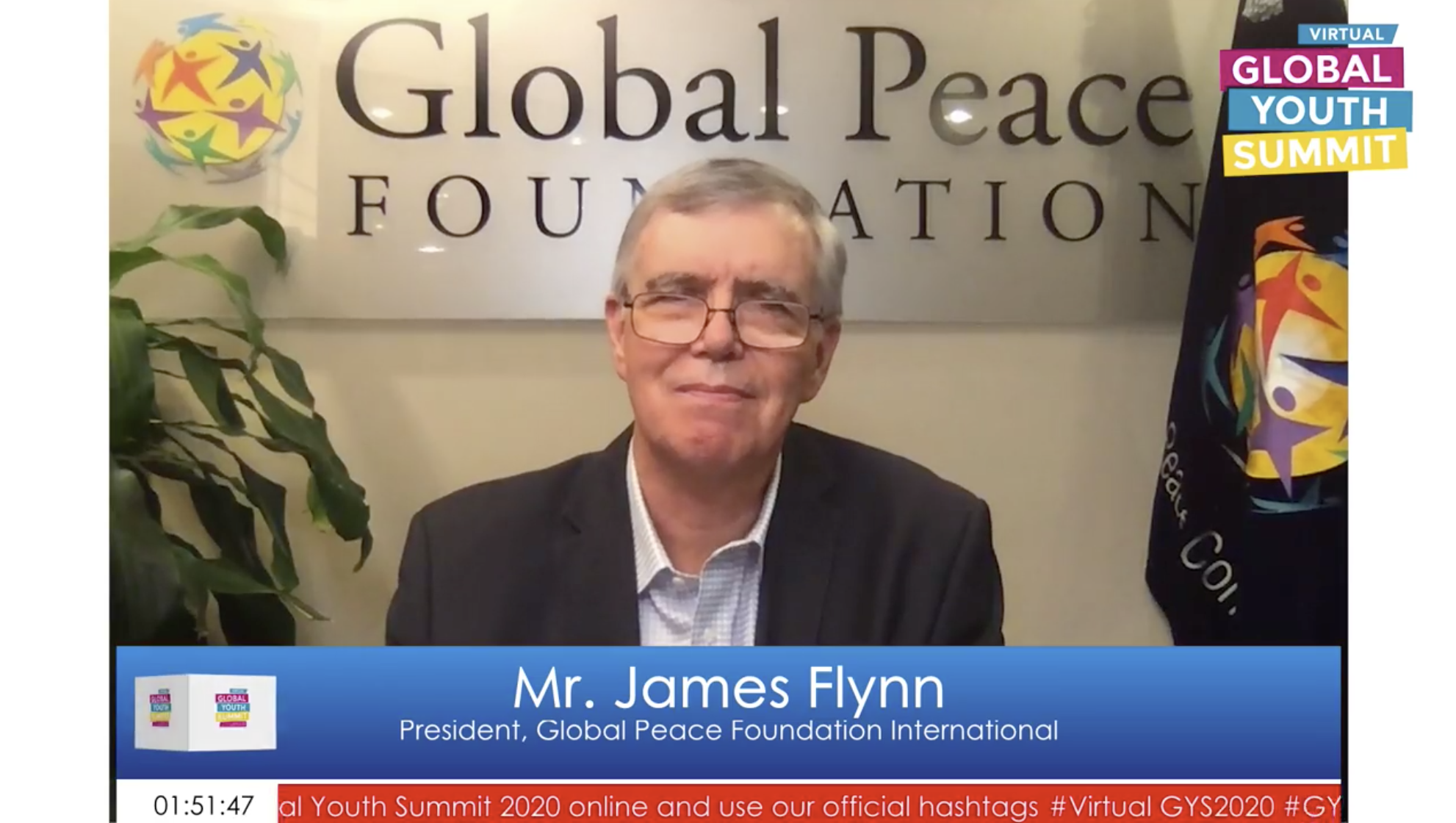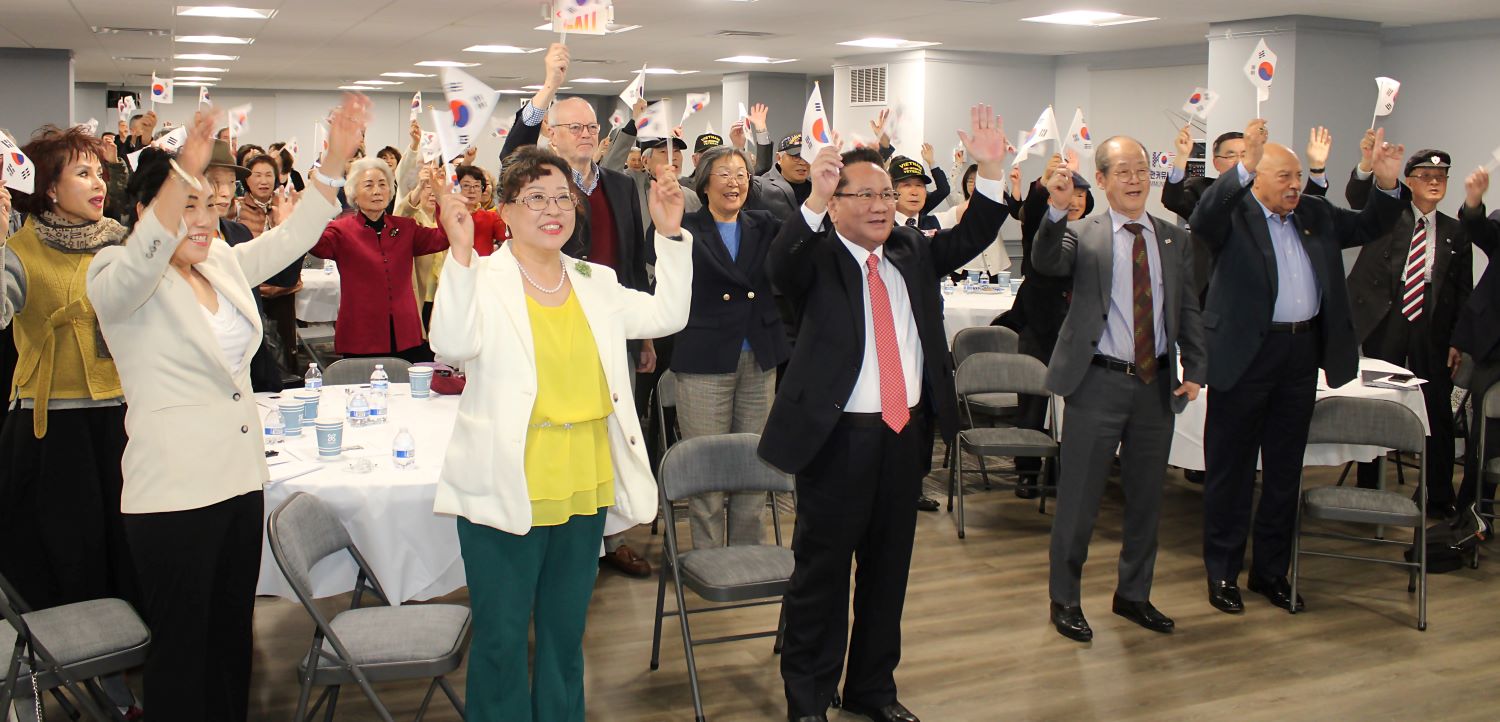
The annual Global Youth Summit normally attracts thousands in Manila, the Philippines. This year, however, due to the global pandemic, the event was hosted online, featuring powerful speakers to thousands more on the worldwide web.
The following speech was given by Global Peace Foundation International President James P. Flynn on August 29, 2020.
Youth Shaping the Future through Moral and Innovative Leadership
Greetings from Washington DC to all the delegates of the Global Youth Summit 2020 joining from the Philippines and around the world!
Let me begin by thanking the organizers of this 8th convening of the Global Youth Summit – SM Cares, the Consuelo Foundation, and Global Peace Foundation Philippines. Let me also recognize and thank all the accomplished speakers contributing over the next two days.
Most importantly, I would like to appreciate all participants of this Global Youth Summit. The fact that you are participating here, investing your time, energy, and focus to address critical issues facing our world today, indicates a quality of character that is vitally needed if we are to build a better future. Simply put, I believe that you are joining here because you care, because you want to make a positive difference, and because you are ready to take action for the greater good.
It is very meaningful that the GYS 2020 is aligning its discussion with the UN 75 initiative, marking the 75th anniversary year of the United Nations’ global work. In that context, you, the participants have decided to address critical issues of reforming education, investing in health, bridging the divides of inequality, harnessing the impact of digital and new technologies, and protecting the environment and natural resources. I am sure the discussions throughout this forum will be informative, practical, and actionable.
I appreciate the opportunity to share some thoughts on leadership at the outset, in particular on the theme of Youth shaping our future through moral and innovative leadership. As we all know, today the world faces dramatically new and challenging circumstances. The unprecedented COVID-19 pandemic is reverberating around the world, with potentially far-reaching social, economic, and geopolitical implications. Such challenges can be daunting, but can also open significant new opportunities. Whatever issue one may hope to tackle, leadership is the most essential key to success. Before addressing the more specific issues of this forum, it is worthwhile to consider a larger perspective on important aspects of leadership.
Technology and globalization are impacting the lives of people everywhere, driving change at a breathtaking pace. We can communicate, transact, and travel with ease previously unimaginable. The internet, or what was initially called the ‘world wide web” was introduced in 1990, merely 30 years ago. Today 4.6 billion people are active users, and the internet is woven into much that we do every day. Google, which did not exist 25 years ago, processes 70,000 searches per second, or 2 trillion searches per year. Steve Jobs unveiled the first iPhone in 2007, and now smartphones are everywhere. There are now more than 10 billion mobile devices in use globally, far exceeding the world’s total population. Innovation and technology have brought remarkable breakthroughs in nearly every area of human endeavor.
Yet with the great promise of this time, we continue to face dire realities on every continent. Consider a few examples:
- The World Economic Forum estimates that the global cost of corruption exceeds $2.6 trillion per year.
- According to the NGO, Children International, 385 million children live in extreme poverty, and 2.4 billion people lack access to basic sanitation services such as toilets or latrines.
- The UN Refugee Agency reports that at the end of 2019, there were 79.5 million displaced persons globally. That means 1% of the total human population have fled their homes due to conflict or persecution.
With the phenomenal progress that humanity has made in so many areas, why are we unable to solve intractable problems like poverty, conflict, and corruption? I believe that our most pressing challenge today is an ethical one. Our technology can gather massive data on our browsing habits and consumer preferences, but cannot help us to understand each other, respect each other, or forgive each other. General Omar Bradley most aptly described the dilemma we face, when he said many years ago:
“Ours is a world of nuclear giants and ethical infants. We know more about war than we know about peace, more about killing than we know about living. We have grasped the mystery of the atom and rejected the Sermon on the Mount.”
There is a significant gap between our external development and our ethical maturity. Technology itself is value-neutral. It can be used to improve the quality of life and well-being for all people, but can also be used to create weapons of mass destruction. We are in dire need of ethical leadership, leadership with moral authority; without it, our ability to realize the promise of the 21st century will be seriously hampered.
Great transformative leaders of the 20th century – Gandhi, King, Mandela – were such persons of moral authority. Of the importance of values, Dr. Martin Luther King Jr. said “this is a moral universe, and there are moral laws of the universe just as abiding as the physical laws.”
So, what do we mean by “moral and innovative leadership”? At Global Peace Foundation, we believe this unique juxtaposition – moral and innovative leadership –encapsulates the leadership qualities needed for our time. A moral leader is guided by an ethical framework rooted in universal principles and shared values. A moral leader has integrity and is committed to advance the greater good before self-interest. To quote the GPF Chairman, Dr. Hyun Jin Preston Moon, who first introduced the framework of moral and innovative leadership in 2010:
“Moral leadership is more precious for the future of a nation than gold, diamonds, or oil. It is guided by a common vision that reflects the most fundamental human aspirations, conforms to the universal spiritual principles that govern human life, and is expressed in shared moral values that can ultimately form a global ethic.”
With a solid ethical framework, innovative leadership can tap the wellspring of innate human creativity and ingenuity, so that the power of innovation can be channeled to address even the most difficult social problems.
According to UN estimates in 2019, the global population includes 1.2 billion persons between the ages of 15-24. That is one in every six persons on the planet. In 2015, the median age globally was 29.6 years, meaning that half the world’s population was under the age of 30. Simply by sheer numbers, youth are key to shaping the future.
There are countless examples throughout history of youth with major impact: Mozart composed his first symphony at the age of 8; American founding father Alexander Hamilton was the top aide to George Washington at the age of 22, and played a major role in shaping the US Constitution at the age of 30; Albert Einstein was just 26 when he published his revolutionary theory of relativity.
Certainly, with today’s remarkable technology and communications tools, the potential for young leaders to make a significant impact is enormous. With the technical tools to spread information and ideas broadly and rapidly, a moral and innovative leader could make meaningful and far-reaching contributions to the betterment of the human family. I am sure you already know of many examples, but let me cite just one: Malala Yousafzai became an advocate for girls’ education in her home country of Pakistan at the age of 12. When she was 15, she was nearly killed in a failed assassination attempt by those opposed to her human rights advocacy. At age 17, Malala became the youngest recipient of the Nobel Peace Prize. Today her cause has become a global movement.
So where does one find such drive and motivation? To believe that I can make a difference. That we can fix a problem, right a wrong, end an injustice. To have confidence that together we can end poverty, solve conflicts, and accomplish sustainable development goals?
I believe that the key is in our essential human identity and our common experience of family.
It is our conviction that all people – regardless of race, religion, ethnicity, or station in life – share a common essence and heritage – our “humanness” extends beyond even our most pronounced external differences. We are all part of the one human family. And we are one family because we all share a common origin, the Creator God. Thus, we at the Global Peace Foundation believe that a simple yet powerful vision statement that can inspire our common effort to build a world of sustainable peace – is One Family under God.
The essence of our humanity, individually and collectively – and the essence of life itself – is intangible, and, we could say, spiritual in nature. We naturally and intuitively recognize that every person has value, has worth. That is why we make great efforts to save even one human life. Our value as human beings is imbued in us by the Creator. That, I believe, is a universal spiritual truth, not a religious statement or doctrine.
That innate spirituality is what the Dalai Lama calls our “humanitarian” nature. It is reflected in the words of the UN Secretary-General Kofi Annan when he said
“In the 21st century, I believe the mission of the United Nations will be defined by a new, more profound awareness of the sanctity and dignity of every human life, regardless of race or religion.”
More than political, economic, or military power, the power that can transform our world is the power of the human spirit. It is the human spirit that aspires to greatness, that can overcome even the most serious obstacles, and calls forth the noble qualities of our character.
If you adopt the framework of moral and innovative leadership, you are choosing to guide your path by an ethical compass, while unlocking your creativity to transform. You can be a leader with compassion and integrity, engaging with personal and collective ingenuity to develop innovative solutions for our challenged world.
I sincerely hope that this Global Youth Summit 2020 is a meaningful, stimulating, and rewarding experience for you. May it motivate you to serve the greater good, to dream big and act big – to build a world free of conflict and corruption, free of poverty and disease, and filled with opportunity and well-being for every member of the global human family.
Thank you for your kind attention.



